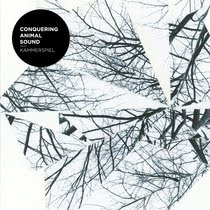
Slink forward Those Dancing Days, then. Having captured the twee zeitgeist in 2008 with their debut record In Our Space Hero Suits, its follow-up Daydreams and Nightmares sees them in an altogether more insistent frame of mind. It’s a bit of a stretch to say they have found a harder edge, but they’ve certainly developed an unmistakable fresh sense of urgency. As well as having attained a new level of vitality, the band also appear to have well and truly nailed the art of the chorus too, as evidenced by the almost instantly memorable mid-sections of ‘Dream About Me’ and ‘Reaching Forwards’
The strongest overall examples of the admirable pop nous of Daydreams and Nightmares can be found in its central one-two of ‘Can’t Find Entrance’ and ‘Fuckarias’, which are without doubt two of 2011’s catchiest singles so far. The breakneck pace of both songs and the snotty attitude of the latter are characteristic of the evolution of the band’s sound. Mind, you, I’m not sure the subject of ‘Fuckarias’ will feel too threatened by the barbs which are being levelled at them: “You’re an uninvited clown... You’re in my space, get out of my face”. Those Dancing Days might be able to convincingly beef up their sound, but, endearingly, their cuddlier core is still pretty plain for all to see.
Throughout Daydreams and Nightmares, in fact, there are numerous reminders that the band haven’t entirely ditched discarded the unfettered tweeness that characterised their first record, and there’s still plenty here for sensitive souls to fall for here. ‘I’ll Be Yours’ and ‘Help Me Close My Eyes’, for instance, are appropriately big-hearted, as is the closing track ‘One Day Forever’ (once you get over the bizarre resemblance between its opening few seconds and those of Grizzly Bear’s ‘Two Weeks’, that is). There’s plenty more evidence of the saccharine in the lyrical content too, or even from a cursory glance at the song titles, illustrating that Daydreams and Nightmares is still, at heart, a collection of sweet pop songs. You’ll just have to circumnavigate the extra layers of polish and synths to find it. Presumably the influence of Patrik Berger, latterly Robyn’s producer, has had a big part to play in all this. Hell, it’s not too much of a stretch to imagine one or two of these songs being recorded by Robyn, most notably ‘Help Me Close My Eyes’.
All in all, the progression Those Dancing Days have shown here is pretty damn impressive by anybody’s standards. Whether this will be acknowledged by either our little world, or the wider public, I wouldn’t like to say. What I can say with some safety, though, is that Daydreams and Nightmares is a better record than In Our Space Hero Suits. A fellow DiS scribe at that time may have decried the band’s lack of anything memorable, but that is no longer an accusation which may be levelled at them with any kind of fairness.
7/10

















